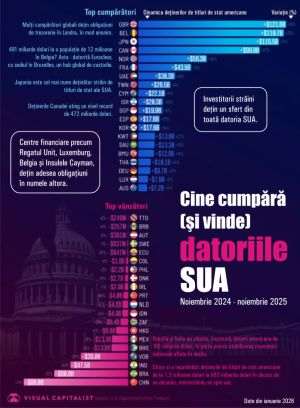Concerned by the contradictory rumors circulating about the second package of fiscal measures - to be approved after this month's budget rectification - the capital market community is wondering what it would do if a significant part of investors moved their activity abroad.
According to political sources of Agerpres, the package includes measures regarding capital taxation and capital transfers, but BURSA sources in the administration told us at the beginning of last week that nothing of the kind has reached the Ministry of Finance.
Some attribute these rumors to political rivalries within the governing alliance. It is said that the PSD, led by Sorin Grindeanu on an interim basis, would not look favorably on the success of the listing of state-owned shares on the Bucharest Stock Exchange - listings that the prime minister would support in order to bring additional revenues to the budget - and would try to compromise the attempt.
Thus, the capital market community is plunged into confusion - exactly what should not happen around a stock market, where privileged information is strictly regulated, but almost impossible to control when it becomes a political weapon.
• Higher taxes, lower liquidity
Before the adoption of the first package of measures - which included the increase in the dividend tax from 10% to 16% starting next year - the idea of increasing the tax on capital gains from stock market transactions was also circulated: from 1% for holdings of more than one year and 3% for those under one year, to a unitary level of 10%. Although the measure was not included in the final package, a PSD proposal is now re-appearing in the press, according to sources, which provides for the increase of these taxes to 10% or 16%, depending on the holding period.
Specialists consulted by the BURSA newspaper warn that the implementation of such a measure would discourage trading and would massively diminish the liquidity of our capital market, practically compromising the prospect of becoming an emerging market in the true sense of the word. Moreover, they point out that an increase to 10% or 16% cannot be applied without the possibility of deducting losses. Without this mechanism, investors would end up paying taxes on winning trades, even if they lost money overall - an absurd situation that penalizes the logic of investment diversification.
• Brokers: "Liquidity would be killed”
Increasing the tax on trading gains to 10% or 16% would "kill” liquidity, which is very low in our country anyway, warns an experienced broker in our market.
"No tax increase is good, but increasing the tax without deducting losses would be madness. The current taxes of 1% or 3% are bearable, but at 10% or 16% investors will no longer sell. Over time, liquidity will decrease, which will compromise the chances of our market meeting the conditions for inclusion in the ratings agencies' indices. Investors will probably also leave, because they will not want to remain in a captive market,” he points out.
Currently, our market is classified as a secondary emerging market by FTSE Russell, but it remains a frontier market for MSCI - the most important rating agency in the world.
The criterion not met? Liquidity.
And that is exactly what would be undermined by such a fiscal measure.
• Complicated taxation, source of absurdity
Brokers are currently like tax agents because they withhold tax at source, says the director of a financial brokerage company.
"By returning to the previous form (ed. 10% tax, without withholding at source) it is possible that the state will collect less and there is no control over withholding. Increasing it to 10% or 16% without taking into account losses would be a disaster. An investor may be in a situation where he has a loss on some transactions, a profit on others, but overall he loses money and has to pay tax on winning transactions. He basically loses money and has nowhere to pay the tax," the broker also emphasized.
The current taxation system - 1% and 3%, with withholding at source - was introduced in 2023 and is considered "acceptable" by investors. Before that, transactions were taxed at 10%, but losses could be deducted and carried forward over a period of seven years.
• Lawyer: "You can't punish the portfolio investor by telling him that his losses don't matter"
The tax increase will discourage trading, says a lawyer specializing in capital market law, in whose opinion the authorities should rather pay increased attention to transactions made outside regulated markets.
"There are companies that operate on Romanian territory without being authorized and that cause damage. In addition, amounts of money are being transferred that are not taxed, amounts that result from activities of this type - selling crypto, CFDs, some of which are even scams. I think that money could be obtained for the budget if there were a much stricter verification of these activities", the lawyer told us.
In his opinion, in the case of an increase in the tax on capital gains, the deduction of losses is mandatory - not just for one or two years, but for several years. "You can't punish the portfolio investor, who tries to support companies and the market through investments, by telling him that his losses don't matter," the lawyer pointed out.
• What's next
The governing coalition established last Wednesday that the second package of reform measures should be approved after the August budget rectification, according to Agerpres sources.
The parties have a week to make improvements to the project, which will then enter the decision-making transparency procedure, to obtain opinions from the Economic and Social Council and the Superior Council of Magistracy (for the special pensions part). The government can subsequently adopt the project, either by assuming it in Parliament or by a vote in an emergency procedure.
The government is playing a dangerous game. Instead of building trust and attracting capital to the stock market - a transparent and vital source of financing for the economy - it is throwing the market into a fiscal and political fog. If the increase in the tax on stock market gains is doubled by the refusal to allow the deduction of losses, then the Romanian capital market risks losing its liquidity, remaining captive and even being "demoted” before it has reached the big league. A wrong step here does not only mean less money in the budget. It means years lost for the development of the stock market and a bleak message to investors: in Romania, capital is not welcome.
















































